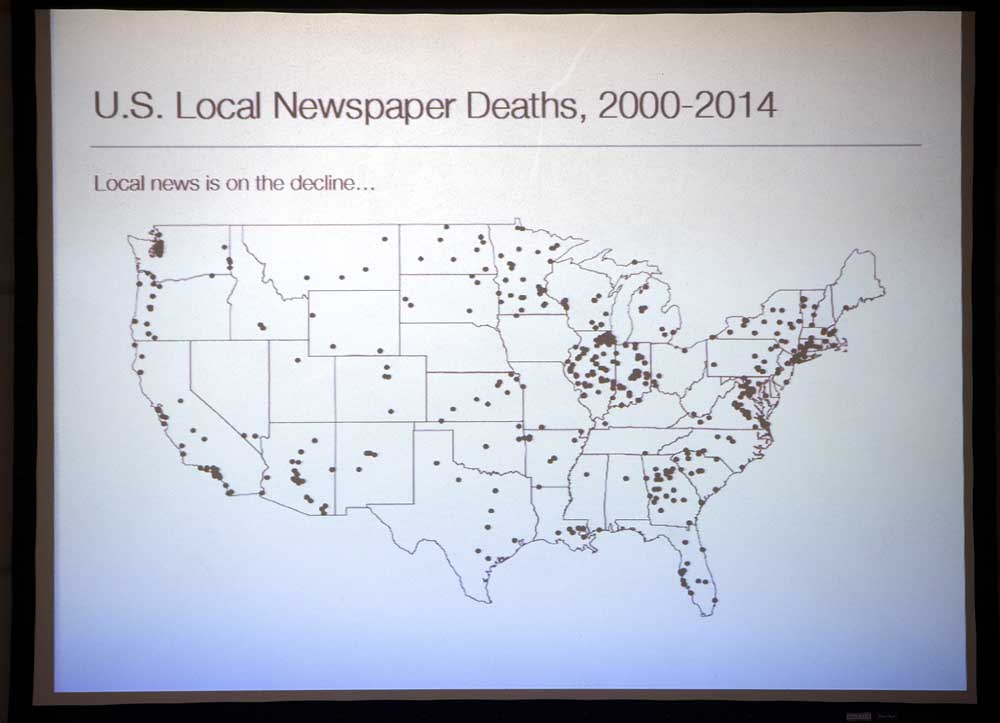Texas A&M professor discusses how losing local newspapers affects local elections, politics, community
Published 6:15 pm Monday, April 15, 2019

- Dr. Johanna Dunaway, Texas A&M University associate professor of communication shows a slide of newspapers that have closed from 2000-2014 during her presentation at Tyler Junior College on Monday about her research on the effects of the media on politics, focusing on what happens when local newspapers close. (Sarah A. Miller/Tyler Morning Telegraph)
A communications professor from Texas A&M University shared results of research she and her associates conducted on the effects losing local newspaper outlets is having on politics around the country at Tyler Junior College on Monday.
About 75 students and faculty gathered in a Jenkins Hall classroom to hear about Johanna Dunaway’s research on local newspapers closures and what effects that loss of local media has on communities. M. Roberts Media, owner of the Tyler Morning Telegraph, co-sponsored her visit.
“Local newsrooms have built and developed rapport and trust with local sources,” Dunaway said. “This is the recipe for a deeper, more informed news product. Losing local newsrooms takes away capabilities and expert-based coverage goes away.”
She said small, local newsrooms produce content seen online and on social media and news aggregators pull that content from newsrooms around the country.
Dunaway said places where local newspapers have closed are living in an unhealthy local news ecosystem.
“It’s compounding information inequities,” she said. “Living in local news deserts makes it hard to find local news about communities, health, services, schools and crime.”
She said the loss of local newspapers reduces the media’s ability to be the local watchdog; local governments spend money more recklessly; politicians are not as responsible to constituents and incumbents are re-elected at higher rates because there is no reporting on the misdeeds and poor performance when it happens.
“It doesn’t even matter if the newspaper has a lot of readership; the effects seen were the same,” Dunaway said. “There is reduced electoral competition if there isn’t a local newspaper. More people stay in power longer because there isn’t a robust media telling people how they are doing.”
Dunaway also said the voter turnout is lower and, in a particular review of 2012 elections, split-ticket voting declined by 2 percent in communities without local newspapers.
She said the loss of local newspapers takes away the microphone on what U.S. senators and representative are doing and changes the incentive structure because the public ends up seeing representatives serving their party, not how they serve their districts.
Chapel Hill High School journalism teacher Jessica Otte brought her newspaper and yearbook staff to the presentation.
Otte said she wanted her students to see the impact of news on a bigger scale.
“Before the event, I told them that they would probably hear about the biased media slant due to a lack of local newspapers,” Otte said. “I’m teaching them to report facts to avoid those biases.”
Dunaway also mentioned the budget constraints that local media outlets are facing that’s contributing to the closures of local papers.
“It is problematic,” Nancy Carter, TJC professor of economics, said. “I don’t know what the solutions are, but she’s (Dunaway) on to something. Local papers need a more local focus. The national media cannot provide that. Local papers cannot compete with national papers. They don’t have the resources.”
Dunaway said she had a great time giving the presentation and got a lot of great questions from the group.
“I feel it’s our job as professors and academics to go out and do outreach and engage with the public,” Dunaway said.
TWITTER: @LouAnnCampbell






